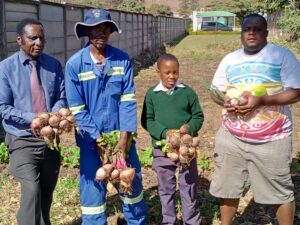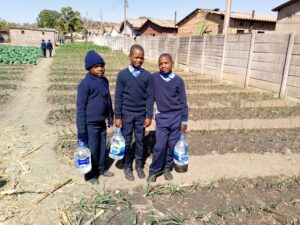In a world full of challenges, the message of the Tibatsirane Foundation in Zimbabwe is one of health, hope, and prosperity. Led by our Movement of Life Zimbabwe national coordinator Bruce Kanengoni, and supported by the Dr. Rath Health Foundation, people living in poor suburbs of Harare, the country’s capital, are benefitting from this mission and being given the opportunity of a better future.
Armed with our educational information on how to stay healthy through starting a vegetable garden to improve micronutrient intake, Bruce is working to improve lives where he lives. He initially started with just a single school. Within only a short space of time, however, the number of schools involved in the project had grown to three. This soon sparked interest and involvement from the local community.
Zimbabweans have struggled with war, corruption, hyperinflation, and industrial mismanagement for close on four decades now. Poverty increased significantly during the 1990s, across all sectors of the economy. During the COVID-19 pandemic, around 7.9 million people – half of the country’s population – fell into extreme poverty.
Despite these challenges, Zimbabweans tend to be optimistic, entrepreneurial, and community minded. When Bruce introduced the Movement of Life program in his area, interest and enthusiasm blossomed quickly. Here was an easy way for people to obtain healthy food without needing money to buy it, and, at the same time, learn new skills.
Inspiring feedback
Bruce recently interviewed students from two of the schools taking part in the project. He also talked to a local community member. Their feedback was inspiring and illustrates how the work in Zimbabwe is already changing lives.
Brenda, the first student Bruce spoke to, is aged 10 and made the following comments:
 “I enjoy learning about nutrition and health. l now know a lot about healthy foods and how to grow them. At home we have a small space that my sister and I have transformed into a vegetable garden. This space is enough for us to feed our family. If we can find additional space for growing more vegetables, we could even sell some of them to benefit the family financially. With this project, if we continue to be creative, we will never be hungry.”
“I enjoy learning about nutrition and health. l now know a lot about healthy foods and how to grow them. At home we have a small space that my sister and I have transformed into a vegetable garden. This space is enough for us to feed our family. If we can find additional space for growing more vegetables, we could even sell some of them to benefit the family financially. With this project, if we continue to be creative, we will never be hungry.”
Kudakwashe, a young boy aged 8, attends the second school that joined the program. He too has been inspired by what he has learned:
“I love learning about nutrition because l have been told which foods are healthy. Some of the foods I used to like are not healthy at all. Now I know what to eat to keep my body healthy and am sharing this with my family. The best part is that with this project I have learned things that will help me in the future. I am happy learning new things, such as how to make our own natural compost and grow food for the family.”
A local father, Mr. Vavakidzani, who lives with his wife and 3 children, commented as follows:
“I’m grateful for this project. While I already had enough space to grow vegetables, without having any garden equipment l was unable to plant anything or make full use of my land. I was therefore very happy to receive garden tools from the Dr. Rath Health Foundation, because now I’m growing enough vegetables to feed my family and can even sell some of them as well.”
Increasing access to water
 The biggest challenge when growing vegetables in Zimbabwe is getting access to sufficient water. Without rain for many months of the year it is almost impossible to dig the soil, which becomes rock hard. Children are therefore encouraged to bring a 5-liter plastic bottle full of water to school every day, to water their vegetables. This has proved to be a good interim measure.
The biggest challenge when growing vegetables in Zimbabwe is getting access to sufficient water. Without rain for many months of the year it is almost impossible to dig the soil, which becomes rock hard. Children are therefore encouraged to bring a 5-liter plastic bottle full of water to school every day, to water their vegetables. This has proved to be a good interim measure.
Seeking a long-term solution, Bruce and a group of community members recently approached the pastor of a local church to ask for his financial help in constructing a borehole for obtaining water. Originally the idea was that this would be situated on school grounds. However, the community decided it needed to be accessible to as many people as possible. As a result, with the pastor’s help, the borehole was installed on what was previously common land.
Having better access to water has since resulted in additional community members wanting to grow vegetables. Step by step, the health, lives, and finances of people in Bruce’s region of Zimbabwe are beginning to improve.







